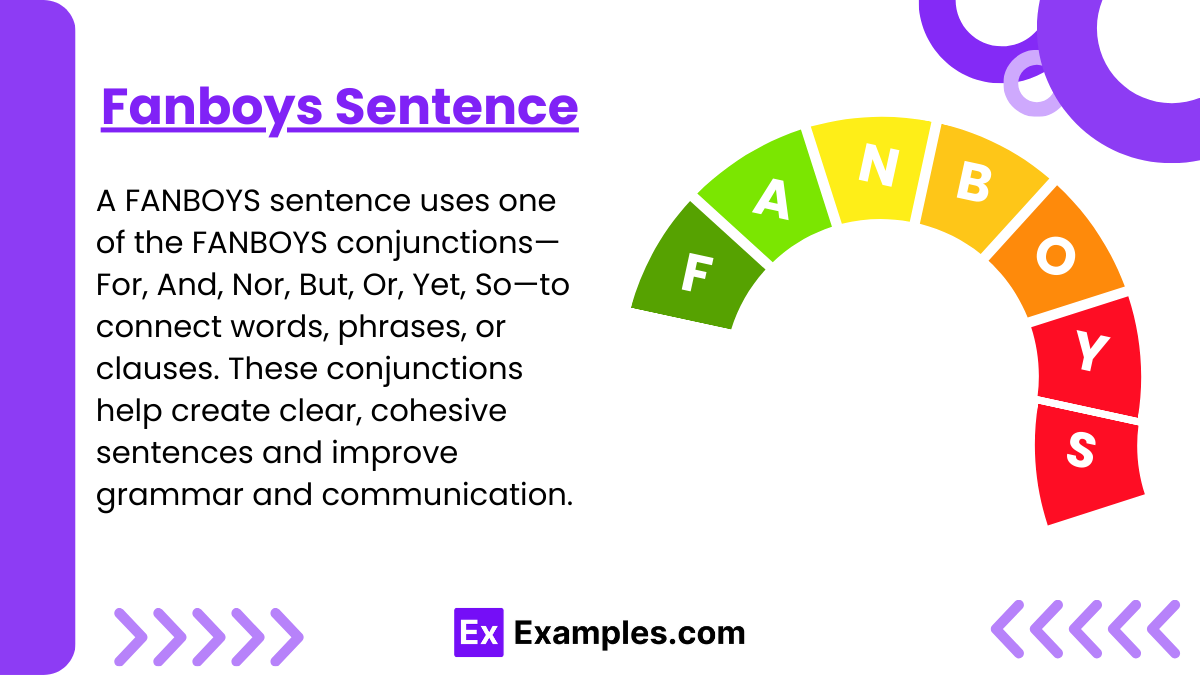99+ Fanboys Sentence Examples
A Fanboys sentence refers to a sentence that uses one of the FANBOYS conjunctions—For, And, Nor, But, Or, Yet, So—to connect words, phrases, or clauses. These small yet powerful words play a big role in building clear and cohesive sentences by linking ideas smoothly. Whether you’re writing stories, essays, or casual messages, understanding how to use FANBOYS helps improve your grammar and communication.
What is Fanboys Sentence?
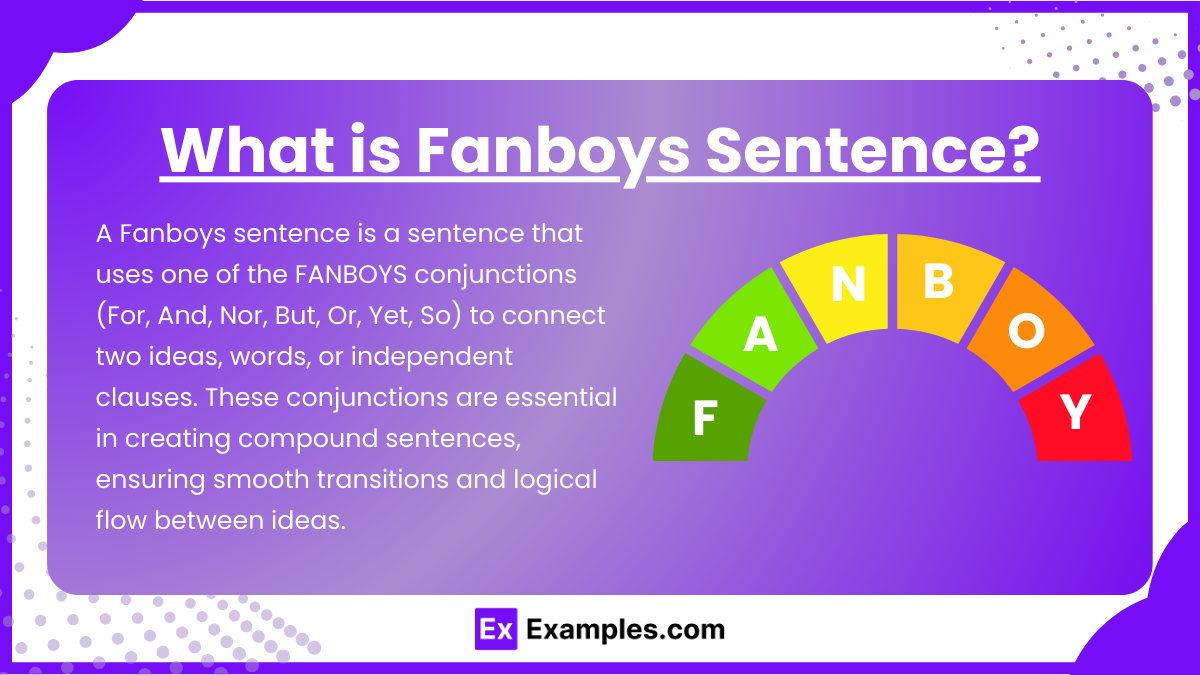
100 Fanboys Sentence Usage Examples
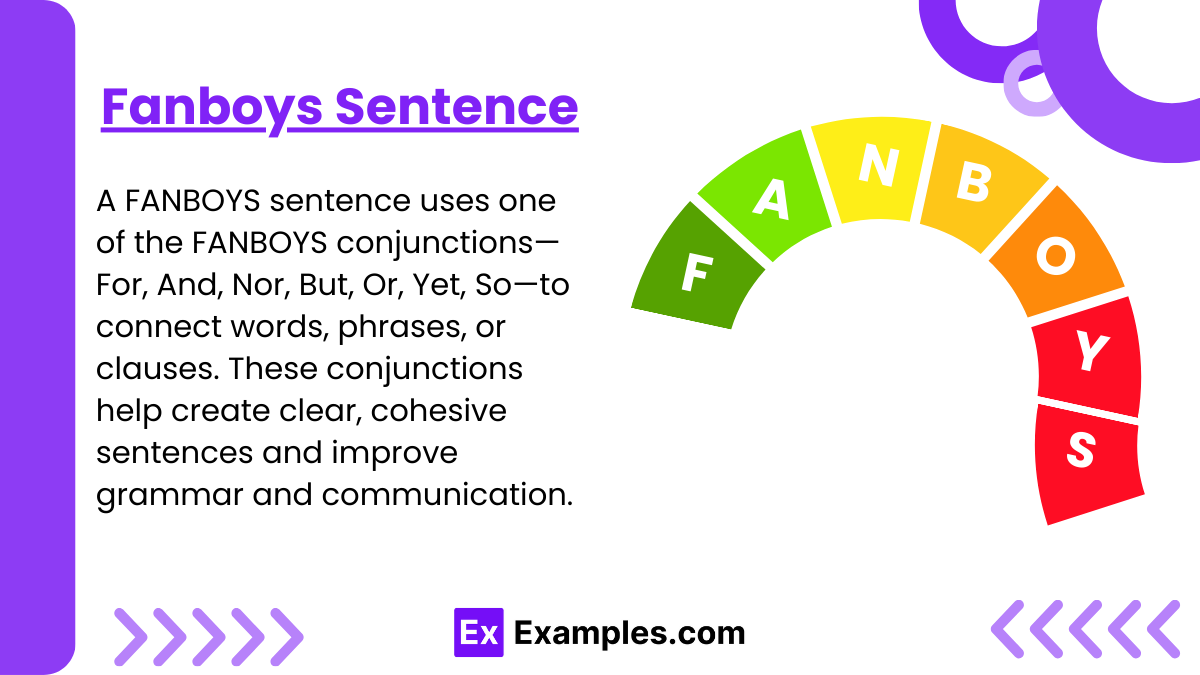
The use of FANBOYS in a sentence can add layers of meaning and clarity to your writing. For, And, Nor, But, Or, Yet, and So are the seven coordinating conjunctions that you can master to craft articulate and compelling sentences. Below, you’ll find a curated list of 100 exemplary sentences utilizing each FANBOYS conjunction, and for better understanding, the FANBOYS word and the dependent clause in each sentence are highlighted.
- I like to read novels, for they expand my imagination.
- She is kind, and that makes everyone love her.
- You can either study now or regret it later.
- He is rich, but unhappy.
- It was raining, so we stayed home.
- She didn’t call, nor did she text.
- He was tired, yet he finished the project.
- She wanted to travel, for it was her life’s passion.
- He drank water and ate some bread.
- She neither likes tea nor coffee.
- I didn’t go to the party, but I sent a gift.
- He is ill, so he won’t come to work.
- We played hard, yet lost the game.
- She is small, but very strong.
- I like to play chess, for it sharpens my mind.
- She loves reading and listens to podcasts frequently.
- They don’t like sweets nor are they fond of spicy food.
- He needed to work late, so I cooked dinner.
- You can either do it now or suffer the consequences.
- She was feeling cold, yet she refused to wear a sweater.
- You should study well, for your exams are near.
- He is a good singer and also plays the guitar.
- You are neither late nor early; you are just on time.
- She did her best, but still failed the exam.
- The movie was long, so I got bored.
- She was tired, yet she completed her work.
- Tim eats healthy and exercises regularly.
- He had a headache, for he had been working all day.
- Either you apologize or leave the room.
- The sky was clear, yet it rained unexpectedly.
- She wanted to buy a dress, but it was too expensive.
- He studied hard, so he got a scholarship.
- They were late, yet they managed to catch the train.
- You can either eat now or after the meeting.
- I like tea and also enjoy coffee.
- He’s really good at math, for he practices daily.
- She’ll finish the project, but only if you help her.
- You’re neither a follower nor a leader.
- He was angry, so he left the room.
- Sally loves to read; however, she doesn’t like to write.
- The test was hard, yet he managed to pass.
- We can either go to the movies or stay home and read.
- She was sick and couldn’t come to the party.
- I failed the test, for I didn’t study.
- He likes chocolate but dislikes vanilla.
- The show was boring, so we left early.
- The food is good, and the service is excellent.
- It was raining, yet they continued to play.
- She doesn’t like coffee, nor does she like tea.
- You can have tea or you can have coffee.
- He’s not only intelligent but also hardworking.
- The movie was neither interesting nor entertaining.
- I wanted to stay, yet I had to go.
- She studied hard for the exam was tough.
- He ran fast, so he won the race.
- The food was delicious, and the atmosphere was great.
- He didn’t like the book, nor did he like the movie.
- You can either walk or take the bus.
- I don’t like broccoli, but I love spinach.
- The assignment was difficult, yet I finished it on time.
- She’s not only a great artist but also a wonderful person.
- I like coffee and I love tea.
- I have traveled to many countries, yet I still feel there’s more to explore.
- He was poor, so he couldn’t afford a new car.
- You should either cook or order food.
- She had to leave early, for her children were alone at home.
- He passed the test, and he was relieved.
- It was raining outside, yet the kids wanted to play.
- You can neither speak loudly nor use your phone here.
- She was tired, so she took a nap.
- They wanted to go to the beach but it was too cold.
- He could either eat now or wait for dinner.
- The dog barked loudly and woke up the baby.
- She tried hard, yet she didn’t win the competition.
- I have never been to Europe, nor do I plan to go soon.
- He was not only talented but also very humble.
- She was running late, so she called to inform them.
- He couldn’t find his keys, for he had left them at the office.
- The show was boring, and we left early.
- He neither likes coffee nor enjoys tea.
- She was feeling sick, yet she completed her work.
- He was busy, so he could not attend the meeting.
- The film was not only entertaining but also educational.
- I wanted to go shopping, but I had no money.
- She loves chocolate, and she also likes vanilla.
- You can either stay here or go to the other room.
- He was reading a book, for he had finished all his chores.
- They were lost, so they asked for directions.
- She neither called nor texted to cancel the appointment.
- The meeting was important, yet he arrived late.
- The car was old, but it was reliable.
- She is either coming by bus or by train.
- He wanted to buy the shirt; however, it was too expensive.
- I was tired, so I went to bed early.
- The movie was not only suspenseful but also thought-provoking.
- He was qualified for the job, yet he was not selected.
- She had studied hard, and she passed the exam.
- You can neither eat nor drink in the classroom.
- I didn’t like the music, for it was too loud.
- She had to work late, so she couldn’t join us for dinner.
Fanboys Sentence at the Beginning Examples
When FANBOYS conjunctions appear at the beginning of sentences, they introduce a sense of transition or emphasis. This writing style is often employed to enhance readability and clarity. Explore these effective strategies with 10 unique and distinct examples of sentences where Fanboys are used at the beginning of the sentence.
- But remember, the test is on Monday.
- Or perhaps, you could go by bus.
- And yet, he failed to see the importance.
- So now, we turn to the next chapter.
- Nor could I believe what I was seeing.
- For example, she likes reading.
- But of course, we can reschedule.
- So there, the problem was solved.
- Or maybe, you can join us later.
- Yet surprisingly, he agreed.
Compound Fanboys Sentence Examples
Compound sentences with FANBOYS (For, And, Nor, But, Or, Yet, So) are used to link two or more independent clauses. This method is vital for building complex thoughts and delivering them effectively. Dive into these 10 unique, richly crafted examples of compound sentences employing Fanboys.
- She studied hard, so she aced the exam.
- I love coffee, but it keeps me awake at night.
- We were late, yet we managed to catch the train.
- She was tired, nor did she have the energy to continue.
- He was not hungry, for he had just eaten.
- The sun was setting, and the sky turned pink.
- I didn’t like the movie, but I watched it anyway.
- You can take a bus, or you can walk.
- She is neither here, nor there.
- He is lazy, yet very talented.
With these illustrative examples, you can enhance your ability to construct effective Fanboys sentences, whether you’re placing them at the beginning or employing them in compound structures.
Fanboys Sentence Examples for Kids
- I wanted to play outside, but it started raining.
- She likes apples, and she also loves oranges.
- He didn’t study, so he didn’t pass the test.
- You can have pizza, or you can eat pasta for dinner.
- The dog was tired, yet it kept running.
- I want to draw, nor do I want to paint right now.
- We went to the park, and we played on the swings.
- She was hungry, for she hadn’t eaten all day.
- You can watch TV, or you can read a book before bed.
- He forgot his homework, so the teacher gave him extra time.
Coordinating Conjunction Fanboys Sentence Examples
- I was tired, but I finished my homework.
- She wanted to bake cookies, and he wanted to make a cake.
- He didn’t know the answer, so he guessed.
- You can go to the beach, or you can stay home and relax.
- They were late, yet they still made it to the event.
- I don’t like soda, nor do I enjoy sugary drinks.
- We wanted to play soccer, but the field was closed.
- He missed the bus, for he woke up late.
- You should clean your room, or your parents might get upset.
- The kids were excited, and they couldn’t wait to start the game.
“Yet” Fanboys Sentence Examples
- I was tired, yet I stayed up to finish my project.
- She felt nervous, yet she gave an amazing speech.
- It was raining heavily, yet they decided to go for a walk.
- He worked hard, yet he didn’t get the promotion.
- The cake looked delicious, yet it tasted bland.
- They were running late, yet they stopped for coffee.
- The story was confusing, yet it was still enjoyable.
- He was shy, yet he spoke confidently in the meeting.
- The dog was small, yet it barked loudly at strangers.
- I practiced a lot, yet I made mistakes during the performance.
Types of Fanboys Sentence
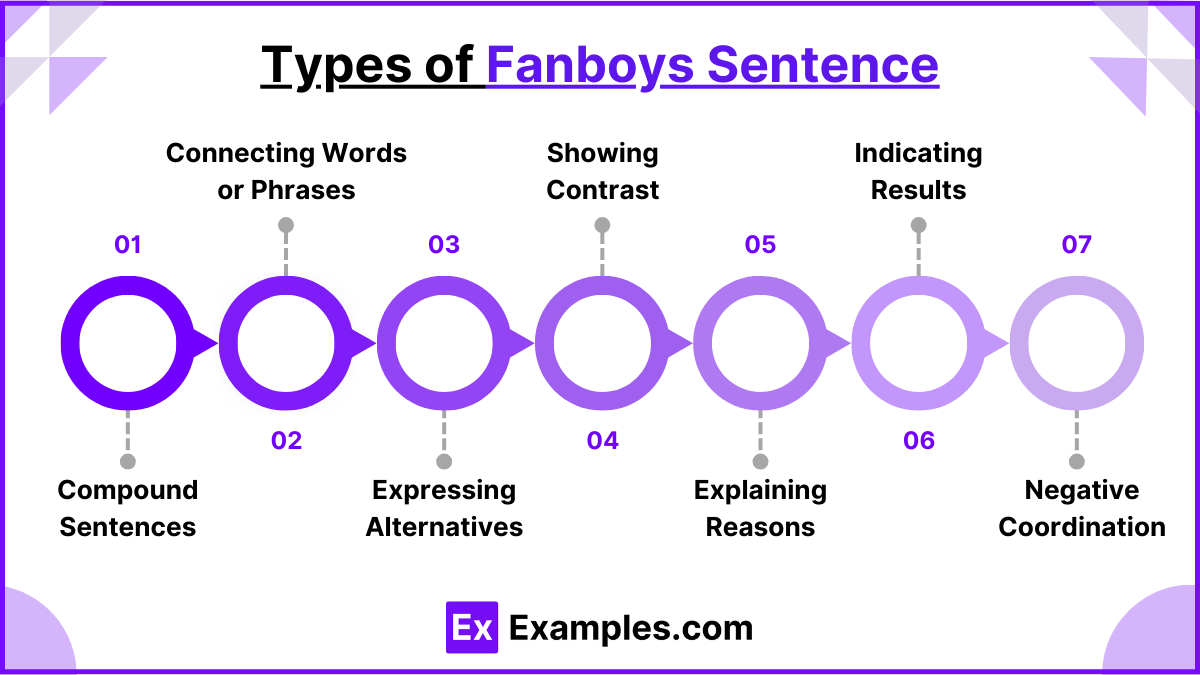
- Compound Sentences
A FANBOYS conjunction is used to join two independent clauses.
Example: I wanted to go outside, but it started raining. - Connecting Words or Phrases
FANBOYS can link two words or phrases in a sentence.
Example: She enjoys reading and writing. - Expressing Alternatives
Using FANBOYS to show choices or options.
Example: You can have tea or coffee. - Showing Contrast
FANBOYS conjunctions highlight contrasting ideas.
Example: He was tired, yet he continued working. - Explaining Reasons
Using FANBOYS to explain why something happened.
Example: She was late, for the bus broke down. - Indicating Results
FANBOYS conjunctions show cause-and-effect relationships.
Example: He didn’t study, so he failed the test. - Negative Coordination
Using “nor” to connect two negative ideas.
Example: She doesn’t like apples, nor does she eat oranges.
Fanboys Sentence Structure
The structure of a FANBOYS sentence typically involves joining two ideas (independent clauses, phrases, or words) using one of the FANBOYS conjunctions: For, And, Nor, But, Or, Yet, So.
Structure for Joining Independent Clauses
- Clause 1 + , + FANBOYS + Clause 2
Use a comma before the FANBOYS conjunction when connecting two independent clauses.
Example: I wanted to play outside, but it started raining.
Structure for Joining Words or Phrases
- Word/Phrase 1 + FANBOYS + Word/Phrase 2
No comma is needed when linking words or phrases.
Example: She likes apples and bananas.
Notes on Usage
- For: Explains a reason. Example: I stayed home, for it was raining.
- And: Adds similar ideas. Example: He bought a book and a pen.
- Nor: Connects two negatives. Example: She doesn’t sing, nor does she dance.
- But: Shows contrast. Example: It was cold, but sunny.
- Or: Offers a choice. Example: Do you want tea or coffee?
- Yet: Shows an unexpected contrast. Example: He was tired, yet he kept running.
- So: Shows a result. Example: She was hungry, so she cooked dinner.
How to Write a Fanboys Sentence
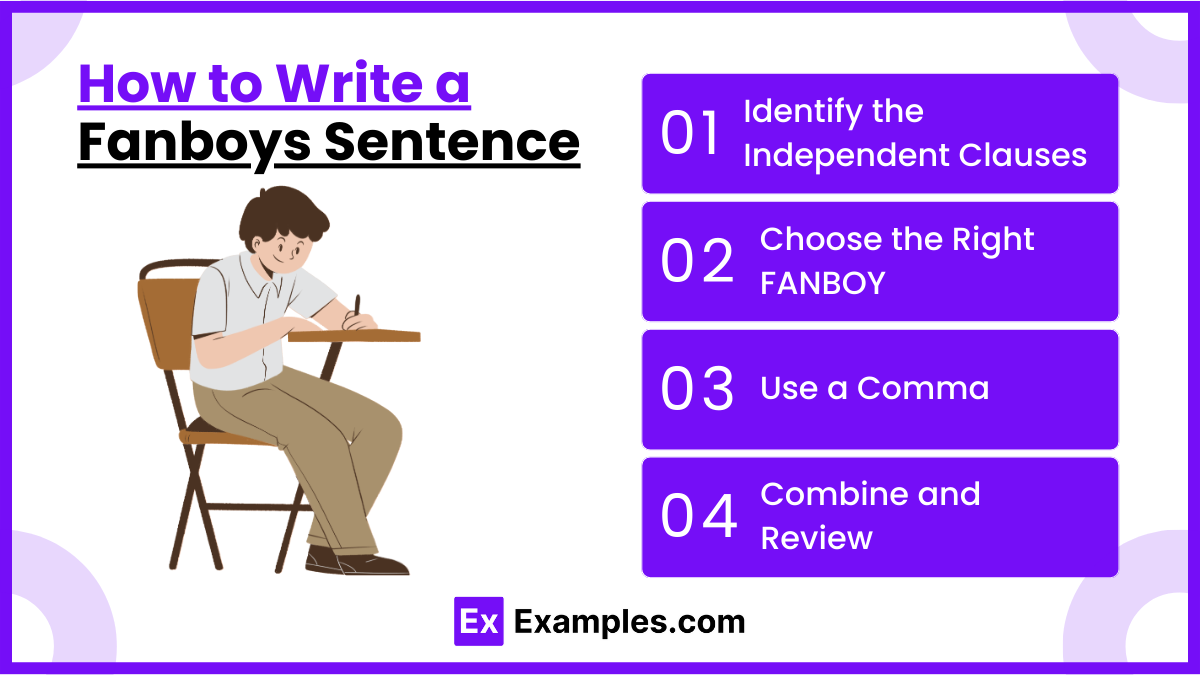
Writing a sentence using a FANBOY conjunction is not as complicated as it may seem. The use of FANBOYS helps in creating more complex and nuanced sentences by connecting phrases, words, or independent clauses. Here is a simple, step-by-step guide to write a sentence using a FANBOY conjunction:
Step 1: Identify the Independent Clauses
The first step is to identify two independent clauses that you want to connect. An independent clause is a sentence that has both a subject and a verb and can stand alone.
Example:
1st Independent Clause: She loves reading books.
2nd Independent Clause: She has a library card.
Step 2: Choose the Right FANBOY
Choose a FANBOY conjunction that logically connects the two independent clauses. Each FANBOY has its own specific use, so make sure you choose the one that best fits the relationship between your clauses.
Example:
FANBOY Chosen: “and”
Step 3: Use a Comma
When connecting two independent clauses with a FANBOY, always precede the FANBOY with a comma.
Example:
She loves reading books, and she has a library card.
Step 4: Combine and Review
Combine all the elements: the first independent clause, the comma, the chosen FANBOY, and the second independent clause. Review the sentence to ensure that it is coherent, grammatically correct, and conveys the intended meaning.
Final Sentence:
She loves reading books, and she has a library card.
Tips for Using Fanboys Sentences
1. Choose Wisely:
Pick the appropriate FANBOY conjunction based on what you’re trying to convey. For instance, use “but” for contrast and “so” for causation.
2. Be Mindful of Punctuation:
Always remember to use a comma when you are connecting two independent clauses with a FANBOY. However, when you’re connecting phrases or single words, the comma may not be necessary.
3. Avoid Overuse:
While FANBOYS are useful for creating complex sentences, overusing them can make your text convoluted. Try to maintain a balance between complex and simple sentences for a smoother flow.
4. Keep It Logical:
The two independent clauses should be logically connected. For example, it wouldn’t make sense to use “yet” if there’s no contrast between the two clauses.
5. Test for Independence:
Be certain that the clauses you are connecting are indeed independent. If one cannot stand alone as a sentence, you’re not using the FANBOY correctly.
6. Combine Similar Ideas:
FANBOYS are excellent tools for connecting similar ideas or themes across sentences, which helps in maintaining paragraph coherency.
7. Vary Your Language:
While FANBOYS are essential, remember to also use other types of conjunctions and sentence structures to keep your writing interesting.
FAQs
Do FANBOYS always need a comma?
A comma is required before FANBOYS when connecting two independent clauses. However, no comma is needed when linking words or phrases.
Can FANBOYS connect phrases?
Yes, FANBOYS can link two phrases or words within a sentence, allowing for smoother sentence flow without requiring a comma.
Why are FANBOYS important in writing?
FANBOYS help create compound sentences, improve sentence clarity, and add logical connections between ideas, making writing smoother and easier to understand.
How do FANBOYS connect sentences?
FANBOYS connect two independent clauses by using a comma before the conjunction or link words and phrases directly without a comma, depending on the structure.
What is the purpose of FANBOYS in grammar?
FANBOYS are used to connect ideas, clarify relationships between clauses or phrases, and create smoother, more cohesive sentences in writing.



